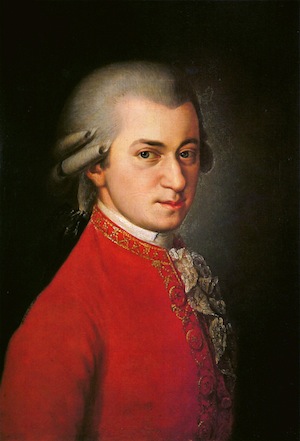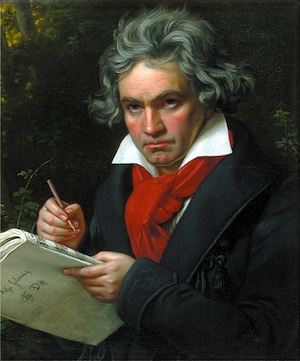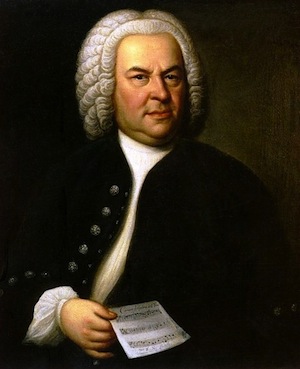After recently spending hours listening to music on YouTube, I was inspired to write another Motivational Music post. Following the debut post about ambient/post-rock music, the genre featured in today’s topic is one that I’ve enjoyed since I can remember: classical. This type of music has been great inspiration for some of my writing in the past, especially poetry (since I like to think of classical music as poetry created with sound). I don’t want to go into “pretentious mode” and pretend to have a Music-major’s extensive knowledge of the genre, though, so for my first post on the subject, I’ll just scratch the surface with a few well-known Classical-era composers: Mozart, Beethoven and Bach.
Wolfgang Amadeus Mozart

Wolfgang Amadeus Mozart (1756-1791)
Genre(s): Classical
Origin: Salzburg, Austria
Writing Inspiration: Poetry, humor
My Favorite Song(s): “Rondo Alla Turca” (Piano Sonata No. 11), “Symphony No. 40”
When thinking of classical music, one of the first names that comes to mind is Mozart, and with good reason. From piano sonatas to orchestra symphonies to operas, his music is wonderfully melodic and an absolute delight to listen to. Though I do enjoy the grander compositions like his 40th symphony, my favorite pieces of his are the lighter sonatas and arias, such as “Rondo Alla Turca” (the last movement of his 11th piano sonata, also known as the Turkish March) and the Queen of the Night aria (from the opera The Magic Flute).
What I find so enjoyable about Mozart’s music is the way it bounces, like the notes are floating on a breeze. Back when I took vocal lessons, I had to learn his piece “Das Veilchen” (“The Violet”), and though it was difficult to sing in German, I still enjoyed it for the bright melody. That’s why I find Mozart inspirational not just for poetry, but for humorous writing. Even when I’m not writing, I like to listen to his compositions just because they put me in a good mood. Whether it’s a grand symphony or a simple piano solo, there’s something about Mozart’s music that always brings a smile to my face.
Ludwig van Beethoven

Ludwig van Beethoven (1770-1827)
Genre(s): Classical (Romantic era)
Origin: Bonn, Germany
Writing Inspiration: Poetry, drama, romance
My Favorite Song(s): “Symphony No. 5“, “Für Elise” (Bagatelle No. 25)
Yes, Beethoven is one of those composers whose music I could listen to all day. While I appreciate Mozart for his upbeat pieces, I enjoy Beethoven for his bold and powerful symphonies, which make excellent inspiration for dramatic writing. I sometimes listen to his fifth symphony when trying to get into a mindset for heavier scenes full of action or strong emotion (as demonstrated beautifully in this segment from Disney’s Fantasia 2000). Of course, the composer wasn’t limited to intense symphonies; one of his most famous pieces is the lovely piano bagatelle “Für Elise”, which contrasts with his more elaborate compositions for its soft and romantic melody.
Beethoven was an important figure in the transition between the Classical and Romantic eras of music, so it stands to reason that his pieces comprise a diversity of sources for writing inspiration, from poetry to drama to romance. Honestly, I find his music so inspiring that I’d recommend it not just to writers, but to artists of any type. If you appreciate music at all, you should have at least one composition by Beethoven in your music player. It’s definitely worth it.
Johann Sebastian Bach

Johann Sebastian Bach (1685-1750)
Genre(s): Classical
Origin: Eisenach, Germany
Writing Inspiration: Poetry, drama
My Favorite Song(s): “Little Fugue (in G minor)“, Cello Suites
While Bach is admittedly not my favorite classical composer as far as concertos, I do enjoy his more subtle music. His cello suites are very beautiful and soothing (especially as performed by Yo-Yo Ma), and I find the slow melodies inspiring for writing drama and romance. My favorite piece, however, is definitely his “Little Fugue (in G minor)”; the music builds up as the different parts blend into each other to create a beautiful harmony, which I enjoy listening to while writing poetry or drama. Fun fact: this piece was adapted for the Dreamworks movie Shrek Forever After, where it plays as a club track (“Rumpel’s Party Palace“) in Rumpelstiltskin’s castle!
Though most of my favorite classical pieces are by Mozart and Beethoven, I find some of Bach’s music just as inspirational for certain forms of emotional writing. At the very least, I’d recommend his cello suites as background music for relaxing, as that can really help make the creative process easier!
Classical music is wonderful to listen to, as much for entertainment as for writing inspiration. Whether you write poetry or prose, comedies or tragedies, you can probably find inspiration in a good classical piece. I hope you enjoy the music I’ve shared with you today, and that you find in it the inspiration you need for your own art! Thanks for reading/listening!


Ah, J.C., you’re speakin my language with this post! I love all three of these composers, Bethoven probably being my favorite of the three just because I have a weakness for his 9th Symphony, and for his bold, powerful builds. I also love Chopin’s piano concertos. They transcend me. Talk about bold! Tchaikovsky is also one I listen to. But I’m partial to piano….that Chopin…*sigh*
Cool! Always good to know others appreciate classical music in this day and age! I like Tchaikovsky too, mostly for Swan Lake, and I definitely have a soft spot for piano. As for my favorite composer, it’s probably a tie between Mozart and Beethoven; their styles are unique, so it really depends on my mood! Thanks for reading! 🙂